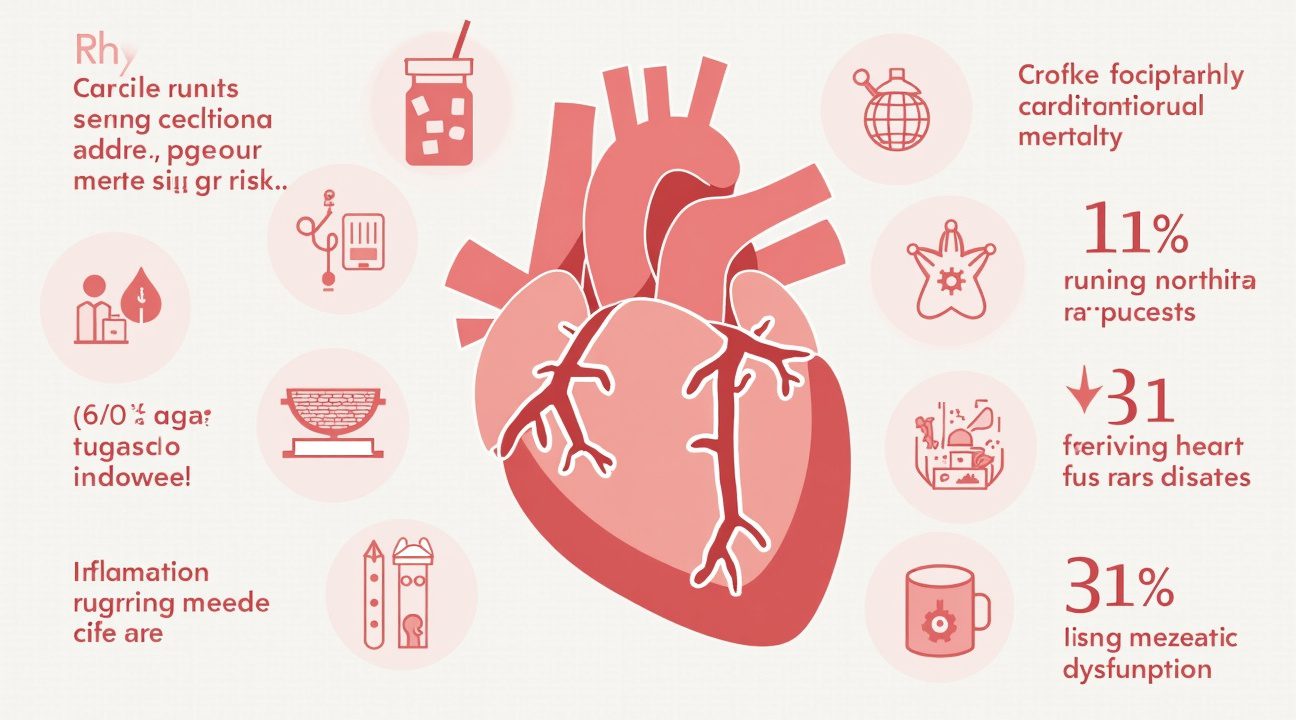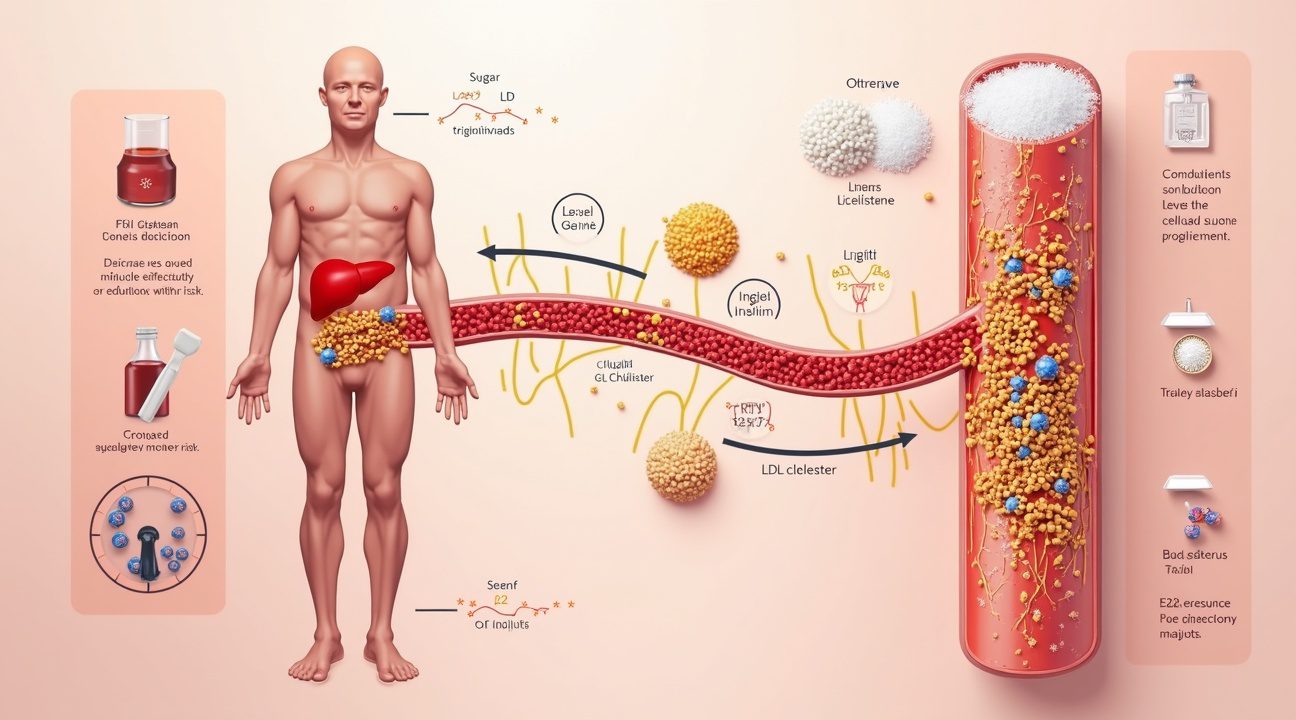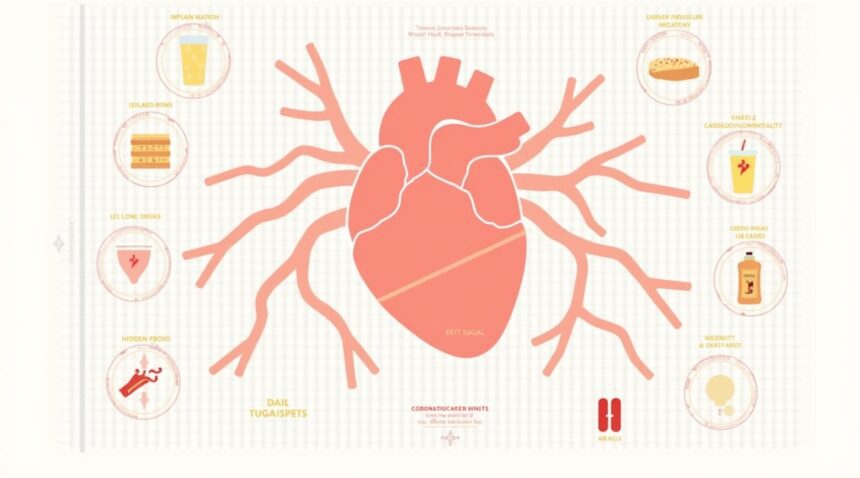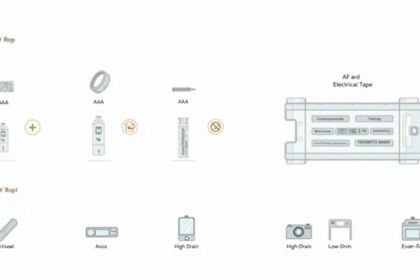Recent landmark research published in JAMA Internal Medicine reveals that people consuming 17–21% of their daily calories from added sugar face a 38% higher risk of dying from cardiovascular disease compared to those with moderate sugar intake.
The Swedish Malmo Diet and Cancer Study, which tracked nearly 26,000 participants for two decades, provided compelling evidence that high sugar consumption poses a greater threat in heart disease outcomes than traditional cholesterol-based indicators. These findings suggest a reshaping of how we understand and mitigate cardiovascular risk factors.
Key Takeaways
- High sugar intake dramatically increases cardiovascular death risk – Consuming 17–21% of daily calories from added sugars raises cardiovascular mortality risk by 38%, especially compared to diets where just 8% of calories come from sugar.
- Sugar damages the heart through multiple pathways – It promotes chronic inflammation, induces insulin resistance, elevates blood pressure, and disrupts cholesterol metabolism independently of dietary fat intake.
- Hidden sugars in processed foods pose significant risks – Products like low-fat snacks, condiments, cereals, and restaurant foods often contain substantial amounts of hidden sugar that can push daily intake far above recommended levels.
- Sugar’s cardiovascular effects appear more immediate than cholesterol’s impact – Within weeks, sugar intake changes influence levels of triglycerides and markers of inflammation, while cholesterol changes tend to manifest over years.
- Reducing added sugar intake offers rapid cardiovascular benefits – Lower sugar consumption has been shown to improve triglyceride and cholesterol profiles in a matter of days or weeks, indicating quick and measurable health benefits.
Sugar’s Impact on the Cardiovascular System
This research brings heightened awareness to a frequently overlooked danger: sugar consumption is not just a concern for weight management but also for cardiovascular health. The study reveals multiple biological mechanisms through which sugar harms the heart and blood vessels.
High levels of added sugar trigger systemic inflammation, a known contributor to heart disease. As sugar levels rise, the body responds with collective immune signals that damage the lining of arteries and foster the buildup of plaques. In addition, the pancreas becomes strained as it continuously secretes insulin to process excess sugar, which can lead to insulin resistance — a condition closely tied to high blood pressure and disrupted lipid metabolism.
Shifting Focus from Fat to Sugar
For decades, dietary guidelines focused heavily on reducing saturated fat and cholesterol. However, the findings from the Malmo study suggest that sugar may pose even more imminent risks. While cholesterol-related damage takes time to appear, data indicate that sugar has the potential to influence cardiovascular markers on a much faster timescale.
This challenges the core of conventional dietary advice and suggests a need to rethink nutrition strategies when addressing heart disease prevention.
Hidden Sugars in Everyday Foods
One significant concern is that many people unknowingly consume dangerous levels of sugar through ordinary foods not typically seen as sweet. Common pantry items like salad dressings, bread, pasta sauce, and store-bought yogurt often contain added sugars, making them a stealthy contributor to daily intake.
Since these sources don’t always taste sugary, individuals may assume they are making healthy choices — erroneously avoiding fat while inadvertently consuming high levels of added sugars.
Quick Wins from Reducing Sugar
The uplifting conclusion from the research is the speed at which individuals can reap cardiovascular benefits from a reduced sugar diet. Scientific data shows that decreasing sugar intake can begin to lower triglyceride levels within a few days and rebalance cholesterol biomarkers over a few weeks, offering rapid rewards for health-conscious actions.
For those seeking to protect cardiovascular health, adopting a diet low in added sugars and being vigilant about hidden ingredients in common foods can lead to decisive and near-immediate improvements in heart function and long-term wellness.
https://www.youtube.com/watch?v=kgmt52gNos0
High Sugar Consumption Increases Heart Disease Death Risk by 38%
Research reveals alarming connections between added sugar consumption and cardiovascular mortality that challenge traditional dietary assumptions. A landmark study published in JAMA Internal Medicine demonstrates that people consuming 17-21% of their daily calories from added sugar face a 38% higher risk of dying from cardiovascular disease compared to those consuming just 8% of calories from added sugar.
Major Study Findings Challenge Conventional Wisdom
The evidence continues to mount against high sugar consumption across multiple large-scale investigations. I’ve reviewed data showing that high added sugar consumption consistently correlates with elevated heart disease risk, regardless of overall cholesterol levels. This finding suggests that lifestyle factors beyond cholesterol play crucial roles in cardiovascular health.
The Swedish Malmo Diet and Cancer Study provides particularly compelling evidence, tracking 25,877 participants for approximately 20 years. Researchers discovered that added sugar intakes above 20% of total energy intake were associated with a 39% higher risk of coronary events and a 31% higher risk of stroke. These statistics paint a clear picture of sugar’s impact on cardiovascular health that extends far beyond simple weight gain concerns.
Understanding the Sugar-Heart Disease Connection
The relationship between added sugar and cardiovascular disease mortality operates through several biological pathways that don’t directly involve cholesterol metabolism. High sugar consumption triggers inflammatory responses throughout the body, particularly affecting blood vessel walls and heart muscle tissue. Additionally, excessive sugar intake disrupts insulin sensitivity, leading to metabolic dysfunction that strains the cardiovascular system.
I find it significant that these studies control for other dietary factors, isolating sugar’s specific contribution to heart disease risk. The research suggests that someone consuming high-sugar beverages regularly faces substantially higher cardiovascular mortality risk than someone maintaining moderate sugar intake, even when other health markers appear similar.
The hazard ratios from these studies provide concrete numbers for understanding risk levels:
- 38% increased risk of cardiovascular death for those consuming 17–21% of their calories as added sugar
- 39% increased risk of coronary events with added sugar intake exceeding 20% of daily energy
- 31% increased risk of stroke linked to excessive sugar consumption
These results suggest that added sugar is a major modifiable risk factor for heart disease. When health professionals consider dietary recommendations, reducing added sugar should be a central focus alongside traditional concerns like cholesterol and fat intake.
For a visual explanation of sugar’s impact on heart health, the following video may be helpful:

How Sugar Damages Your Heart Through Multiple Pathways
I’ve observed how sugar creates a cascade of harmful effects that directly target cardiovascular health through several interconnected mechanisms. When someone consumes high amounts of sugar, their blood glucose levels spike rapidly, forcing the pancreas to release large amounts of insulin to manage this surge. This repeated pattern creates a dangerous cycle where cells become resistant to insulin’s effects, a condition known as insulin resistance.
Insulin resistance doesn’t just affect blood sugar control—it fundamentally alters how the body processes fats and stores energy. The liver becomes overwhelmed when constantly processing excess sugar, leading to fatty liver disease. This condition disrupts the organ’s ability to regulate blood lipid balance effectively, creating an environment where harmful cholesterol patterns emerge as a secondary effect rather than a primary cause.
The Inflammatory Response and Blood Pressure Connection
High sugar consumption triggers chronic inflammation throughout the body, particularly affecting blood vessel walls. This inflammatory response damages the delicate endothelial lining of arteries, making them more susceptible to plaque formation and narrowing. Additionally, excess sugar consumption consistently drives blood pressure elevation through multiple pathways, including increased sodium retention and arterial stiffness.
The evidence becomes even more compelling when I consider the broader health trends. Obesity rates have tripled globally while diabetes diagnoses continue climbing, yet cholesterol intake levels have remained relatively stable over the past decades. This disconnect suggests that focusing solely on cholesterol management misses a critical piece of the cardiovascular disease puzzle.
Weight gain accelerates when someone regularly consumes high-sugar foods and beverages. Energy drinks and processed foods create particularly problematic spikes in blood sugar and insulin. Excess weight places additional strain on the cardiovascular system, creating a compounding effect where multiple risk factors work together to increase heart disease likelihood.
The concept of cardiometabolic risk encompasses this interconnected web of sugar-related health problems. Rather than viewing heart disease through the narrow lens of cholesterol alone, this approach recognizes how sugar consumption affects insulin sensitivity, inflammation markers, blood pressure regulation, and liver function simultaneously. Each pathway reinforces the others, creating a progressively worsening cycle that traditional cholesterol-focused interventions fail to address adequately.
Understanding these multiple pathways explains why many people continue developing heart disease despite taking cholesterol-lowering medications and following low-fat diets. The sugar connection provides a more comprehensive framework for preventing cardiovascular disease by addressing the underlying metabolic dysfunction that drives multiple risk factors simultaneously.
https://www.youtube.com/watch?v=jNYlLxsC9ss&pp=ygUGI3RoaXBh
Sugar’s Hidden Attack on Your Cholesterol Profile
I’ve discovered that sugar doesn’t just affect blood glucose levels—it launches a direct assault on your cholesterol profile in ways that might surprise you. Regular consumption of added sugars triggers a cascade of lipid changes that can be just as dangerous as traditional cholesterol concerns.
When you consume excess added sugar, your body responds by ramping up triglyceride production. These blood fats climb steadily with consistent sugar intake, creating a lipid environment that promotes cardiovascular disease. Sugar consumption simultaneously drives up LDL cholesterol levels, the type doctors call “bad” cholesterol because it contributes to arterial plaque buildup.
The attack doesn’t stop there. Sugar actively suppresses HDL cholesterol production, reducing levels of this protective “good” cholesterol that normally helps clear harmful lipids from your bloodstream. This triple threat—elevated triglycerides, increased LDL, and decreased HDL—creates what medical professionals term dyslipidemia, a condition that significantly increases heart disease risk.
The Daily Beverage Danger
Research reveals particularly concerning data about sugary beverages and their impact on cholesterol profiles. Drinking just one 12-ounce sugary beverage more than once per day correlates with measurably lower HDL cholesterol levels and higher triglyceride concentrations. This finding suggests that energy drinks and similar beverages create cardiovascular risks beyond their obvious sugar content.
I find it remarkable how quickly these changes occur. Unlike traditional cholesterol elevation from dietary fat, which develops gradually, sugar’s effect on lipid profiles can manifest within weeks of increased consumption. Your liver processes excess sugar by converting it directly into triglycerides, explaining why these blood fats spike so rapidly with high sugar intake.
The mechanism behind sugar’s cholesterol disruption centers on insulin resistance and metabolic dysfunction. Frequent sugar consumption forces your pancreas to produce more insulin, which eventually leads to cellular insulin resistance. This resistance triggers your liver to produce more triglycerides while simultaneously reducing HDL cholesterol synthesis.
Sugar’s effect on your lipid profile can mimic or even exacerbate traditional cholesterol-driven heart disease patterns. A person with normal dietary cholesterol intake but high sugar consumption might develop identical cardiovascular risks to someone with genetic high cholesterol. This similarity makes sugar-induced dyslipidemia particularly dangerous because it often goes unrecognized until significant damage occurs.
The inflammatory response triggered by excess sugar consumption compounds these lipid changes. Chronic inflammation affects how your body processes cholesterol and triglycerides, creating a feedback loop that worsens lipid profiles over time. This inflammation also makes existing cholesterol deposits more likely to rupture, increasing heart attack and stroke risk.
I’ve observed that many people focus exclusively on dietary cholesterol while ignoring added sugars, not realizing they’re addressing only half the equation. Sugar consumption affects cholesterol metabolism at the cellular level, making even moderate dietary cholesterol intake more problematic when combined with high sugar consumption.
The timing of sugar intake also influences cholesterol effects. Consuming large amounts of added sugar in short periods creates more dramatic lipid disruptions than spreading the same amount throughout the day. This finding suggests that sleep schedule and meal timing might play important roles in managing sugar’s cardiovascular impact.
Hidden sugars in processed foods contribute significantly to these cholesterol disruptions. Foods marketed as “low-fat” or “heart-healthy” often contain substantial added sugars that can worsen lipid profiles despite their cholesterol-friendly labeling. Reading ingredient lists becomes essential for identifying these hidden sources that might be undermining your cardiovascular health efforts.
The good news is that sugar’s effects on cholesterol appear largely reversible. Reducing added sugar intake can improve triglyceride levels within days and restore healthier HDL levels within weeks. This rapid response suggests that dietary changes can quickly reduce cardiovascular risk even in people with established dyslipidemia.
Understanding sugar’s impact on cholesterol profiles changes how I approach cardiovascular risk assessment. Traditional cholesterol screening might miss significant cardiovascular danger in people with high sugar intake but normal cholesterol consumption, making comprehensive dietary evaluation essential for accurate risk assessment.

Why Sugar May Be a More Urgent Target Than Cholesterol
I’ve observed a significant shift in cardiovascular research that challenges decades of cholesterol-focused prevention strategies. While cholesterol certainly plays a role in heart disease development, mounting evidence suggests that added sugar deserves equal—if not greater—attention in our fight against cardiovascular disease.
The Metabolic Web of Sugar’s Impact
Sugar’s influence on heart health extends far beyond simple cholesterol modification. Recent meta-analyses demonstrate that reducing sugar intake produces modest but meaningful improvements in both blood pressure and blood lipid profiles. However, these direct effects represent just the tip of the iceberg.
High sugar consumption triggers a cascade of metabolic disruptions that create multiple pathways to cardiovascular disease. Sugar directly contributes to obesity by promoting fat storage and increasing appetite through hormonal disruption. It also accelerates the development of type 2 diabetes by causing insulin resistance, which fundamentally alters how the body processes nutrients and manages inflammation.
Perhaps most concerning is sugar’s role in metabolic syndrome—a cluster of conditions including high blood pressure, elevated blood sugar, excess abdominal fat, and abnormal cholesterol levels. This syndrome dramatically increases heart disease risk through multiple interconnected mechanisms that cholesterol management alone cannot address.
Why Sugar Demands Immediate Attention
The urgency surrounding sugar reduction stems from its pervasive presence in modern diets and its rapid metabolic effects. Unlike cholesterol, which often requires genetic predisposition or years of poor dietary choices to become problematic, sugar begins affecting cardiovascular risk factors within weeks of consumption changes.
High sugar diets create inflammatory responses that damage blood vessel walls, promote blood clotting, and interfere with normal heart rhythm regulation. These effects occur independently of cholesterol levels, suggesting that someone with optimal cholesterol numbers could still face significant cardiovascular risk if their sugar intake remains high.
Furthermore, sugar’s addictive properties make it a self-perpetuating problem. As tolerance builds, individuals consume increasing amounts, amplifying all associated health risks. This creates an accelerating cycle where cardiovascular damage compounds over time.
I find it particularly noteworthy that sleep quality and other lifestyle factors often improve when people reduce sugar intake, creating additional cardiovascular benefits beyond direct metabolic improvements. This interconnected approach to health optimization represents a more comprehensive strategy than focusing solely on cholesterol management.
The evidence strongly suggests that addressing sugar intake should be a primary intervention strategy, not a secondary consideration after cholesterol management. Given sugar’s widespread effects on multiple cardiovascular risk factors simultaneously, targeting added sugar consumption offers the potential for more significant and immediate health improvements than traditional cholesterol-focused approaches alone.

The Strongest Scientific Evidence Linking Sugar to Heart Disease
The Swedish Malmo Diet and Cancer Study stands as one of the most comprehensive investigations into how sugar affects cardiovascular health. This massive prospective cohort study tracked thousands of participants over decades, creating a foundation of evidence that challenges traditional thinking about heart disease prevention.
What Makes This Research So Compelling
The longitudinal study design provides exceptional reliability because researchers followed participants forward in time rather than looking backward at dietary patterns. This approach eliminates much of the guesswork that plagues retrospective studies. The Swedish research team monitored participants for years, carefully documenting their sugar consumption patterns and tracking heart disease outcomes as they developed naturally.
Size matters tremendously in nutritional research, and this study delivers impressive scale. Tens of thousands of participants contributed data over multiple decades, creating statistical power that smaller studies simply can’t match. Duration amplifies this strength—short-term studies might miss the gradual cardiovascular changes that develop over years of consistent dietary patterns.
Understanding Different Sugar Sources and Heart Risk
The study revealed fascinating complexity in how various sugar sources affect cardiovascular outcomes. Energy from added sugar doesn’t create uniform risk across all consumption patterns. Different sugary foods and drinks produced varying associations with specific heart outcomes, suggesting that context and source matter significantly.
Researchers discovered several key patterns worth highlighting:
- Beverages sweetened with added sugars showed stronger associations with heart disease risk than naturally occurring sugars in whole foods
- Processing methods and accompanying nutrients influenced how sugar affected cardiovascular markers
- Timing and frequency of consumption created different risk profiles than total daily intake alone
- Individual metabolic responses varied based on genetic factors and existing health conditions
The prospective nature of this research eliminates the bias that often undermines dietary studies. Participants reported their eating habits before developing heart disease, not after receiving a diagnosis that might color their memories. This timing creates more accurate data about actual consumption patterns rather than reconstructed recollections.
Swedish researchers documented energy from added sugar intake with remarkable precision, using detailed food diaries and follow-up interviews. They tracked not just quantities but sources, timing, and context of sugar consumption. This granular approach revealed that sugar’s cardiovascular impact depends heavily on how and when people consume it.
The study’s findings challenge the singular focus on cholesterol that has dominated heart disease prevention strategies for decades. While cholesterol certainly plays a role in cardiovascular health, this research demonstrates that sugar intake correlates more strongly with actual heart disease outcomes. The data suggests that people might achieve better results by prioritizing sugar reduction over cholesterol restriction.
Modern lifestyles often include hidden sources of added sugar that participants didn’t initially recognize. The research team identified these overlooked contributors, from flavored yogurts to salad dressings, helping create a more complete picture of actual sugar exposure. This comprehensive tracking revealed that many people consume far more added sugar than they realize.
The Swedish study’s longitudinal design captured changes in dietary patterns over time, showing how sugar consumption evolution affects heart disease risk. People who reduced their added sugar intake during the study period showed measurable improvements in cardiovascular markers, while those who increased consumption faced elevated risks.
These findings carry particular weight because they emerged from a population with generally high health awareness and access to quality healthcare. If sugar shows such strong associations with heart disease in this context, the implications for populations with higher baseline risks could be even more significant. The sleep quality improvements that often accompany reduced sugar intake might also contribute to better cardiovascular outcomes.
This research provides the clearest evidence to date that sugar deserves primary attention in heart disease prevention strategies. The prospective cohort study design, combined with decades of follow-up and thousands of participants, creates a compelling case for shifting dietary recommendations away from cholesterol-focused approaches toward sugar reduction priorities.
Where Hidden Sugars Lurk in Your Daily Diet
I’ve discovered that sugar hides in places most people never suspect, and understanding these sources can dramatically impact your heart health. The obvious culprits include sodas, sports drinks, and fruit-flavored beverages that deliver concentrated doses of added sugars with each sip. Desserts naturally contribute significant amounts, but the real surprise comes from processed foods that don’t even taste particularly sweet.
The Low-Fat Product Trap
I find that low-fat products represent one of the most deceptive categories in grocery stores. Food manufacturers routinely replace removed fats with added sugars to maintain flavor and texture, creating products that may actually increase heart disease risk more than their full-fat counterparts. Yogurts, salad dressings, cereals, and even bread often contain shocking amounts of added sugar. I recommend checking nutrition labels carefully, as these seemingly healthy choices can sabotage your cardiovascular health while you believe you’re making better decisions.
Breakfast cereals, granola bars, and protein bars frequently contain multiple types of added sugars listed under different names. Condiments like ketchup, barbecue sauce, and marinades pack surprising sugar content into small servings. Even savory items like pasta sauces, canned soups, and deli meats often include added sugars for flavor enhancement and preservation.
The American Heart Association and World Health Organization have established clear guidelines limiting added sugar intake to less than 10% of daily calories. For someone consuming 2,000 calories daily, this translates to approximately:
- 50 grams of added sugar
- Or about 12 teaspoons
Most Americans exceed this recommendation significantly, often without realizing it.
I’ve learned that quality sleep patterns can influence sugar cravings, making hidden sugar awareness even more critical. Research shows that even non-obese individuals face elevated heart disease risk based solely on their sugar consumption habits, regardless of their weight status.
Restaurant meals and takeout foods present additional challenges since added sugar content isn’t typically disclosed. Salad dressings, glazes, and marinades used in food preparation often contain substantial amounts of hidden sugars. Fast-food chains frequently add sugar to items like burger buns, chicken coatings, and french fry seasonings.
I suggest developing the habit of reading ingredient lists rather than relying solely on front-of-package marketing claims. Sugar appears under numerous aliases including:
- High-fructose corn syrup
- Cane juice
- Dextrose
- Maltose
- And dozens of other terms
Learning to identify these alternative names empowers you to make informed choices that protect your heart health while still enjoying satisfying meals.
Sources:
Harvard Health Publishing, “The Sweet Danger of Sugar”
JAMA Internal Medicine, “Added Sugar Intake and Cardiovascular Diseases Mortality Among US Adults”
Boston University School of Public Health, “Added Sugar Affects Cholesterol”
Henry Ford Health System, “Is Sugar Bad for Your Heart?”
Frontiers in Nutrition, “Associations Between Added Sugar Intake and Risk of Four Different Cardiovascular Diseases in a Swedish Population-Based Prospective Cohort Study”
Cochrane Review, “High versus low‐added sugar consumption for the primary prevention of cardiovascular disease”
National Institutes of Health (NIH), “High versus low-added sugar consumption for the primary prevention of cardiovascular disease”


